Unit 2 The universal language Period 3 习题 1
- 格式:doc
- 大小:100.00 KB
- 文档页数:9

Unit 2 the universal language1.Music is the utmost in life. Music is the clear spring of life. Music is the furnace of temperamental refinement.Universal 宇宙的;通用的;全球的Utmost adj. a.极端的;极度的;最远的;最高的n.极度;极端;最大限度Furnace n.火炉;熔铁炉;磨炼;严酷的考验vt.在炉中加热;(似火炉般)散发Temperamental a.气质的;易生气的;敏感的,神经质的;多变的;冲动的temperament 性情;气质[音乐]平均律;调和(节)Refinement n.精炼,精制;文雅;精密;巧妙;精炼的产品;精心的安排;巧妙的发挥;改善2.Make a profile of an english song.Profile n.侧面;轮廓;形象;简介v.描绘 ... 轮廓;评论人物3.4.5.6.(1)创作(音乐),作曲;撰写Mozart composed his last opera shortly before his death.She spent her spare time composing poems.她利用空闲时间写诗。
(2)组成,构成(一个整体)常见搭配: be composed of =be made up of=consist of (整体)由...组成/构成Water is composed of/is made up of/ consists of hydrogen and oxygen.水由氢和氧组成。
composer n. [C]作曲家,创作者composition n. [U]成分,构成;作曲,创作; [C](音乐、艺术、诗歌的)作品READIN; G understanding culture through music1.I watched a performance of...., a beautiful violin concerto composed by ....2.It is a piece that really deserves to be heard.Sth deserve doing/ to be done.1.deserve +n. /pron. 值得....,应得.....deserve to do sth. 应该做某事(主语通常为sb. )His children’s books are classics that deserve knowing much better/to be much better known. 他的童书都是经典作品,值得为更多人所知晓。


unit2《The universal language》Reading 中知识点1.universal adj 普遍的,共通的,公认的,宇宙的。
War causes universal misery. 战争造成了普遍的痛苦。
Television provides universal entertainment。
电视提供了大众娱乐。
a universal rule 普遍适用的规那么。
2.star. vt.star (in sth) be a star ( in a play, film, etc.)在〔戏剧,电影中〕担任主角,主演She is to star in a new film .她将主演一部新影片。
star sb. (in sth) present sb. As a star, feature sb.使某人担任主演,由某人主演。
My favourite film stars Marilyn Monroe.我最喜欢的电影由玛丽·梦露主演。
The director wanted to star Michael Caine in his new film.这位导演想让麦克尔。
凯恩主演他的新片子。
stardom n.明星或主演的地位,身份。
3.cast vt. (pt ,pp. cast) give (an actor ) a part in a play由……主演,使……成为明星,由……担任主角cast sb.(as sb) , cast sb. (in sth)He was cast as Othello/ in the role of Othello.他将被选派担任奥赛罗这一角色。
4.outdoor adj [attr 作定语]of used in, done in or existing in the open air(outsidea building or a house) 户外的,户外用的,露天的outdoor activities 户外活动outdoor clothing 户外穿的衣服outdoor sport 户外运动outdoors adv.在户外,在露天,在外面Indoor adj. Indoors adv.5.be drunk with 醉心于……,沉溺于……由于……而忘乎所以It’s reported that many middle school students are drunk with playing puter games. The young couple were drunk with their happy and peaceful life.6.dare vi (with or without to),1)〔用或不用 to,〕敢于,敢胆敢。

Unit 2The universal languageExtended readingI. Learning objectivesBy the end of the lesson, the students will be able to:1.learn about Beethoven’s life and his works;2.discuss the personality of Beethoven;3.master the writing techniques of this article.II. Key competence focusL earn about Beethoven’s life and his works.III. Predicted area of difficultyMaster the writing techniques of this article.IV. Teaching proceduresStep 1 Lead-inT plays a Quiz with Ss to arouse their interest in the well-known musician:T lists relevant information and encourages Ss to guess the name of the musician. 【设计意图:学生通过猜名人游戏对即将阅读的故事主人公相关信息有一定的了解,同时吸引学生对高雅艺术的求知欲望,为下一步分析人物品质打下基础。
】Step 2 Global reading1. T asks Ss to go through the passage quickly and sum up the main idea of each paragraph.2. T encourages Ss to analyze the structure of the passage.【设计意图:指导学生通过获取、概括、整合等思维活动定位归纳段落主题句,概括段落大意,学会从宏观层面把握文脉,理清语篇整体结构,快速找出文章主旨,培养学生查找、处理、整合信息的能力。


Unit 2 The universal languageExtended reading 教案教材分析:本课时通过阅读《贝多芬:卓越的一生》的,要求学生完成包括阅读、讨论、摘要写作等学习任务,其中包含了贝多芬著名作品《第九交响曲》的描述、人生挫折和应对方法等。
本文的价值取向在于学生通过学习,深度思考成为伟大音乐家的因素,保持正确价值观看待音乐家成功背后的故事,并提高对于音乐的理解。
教学策略与设计说明:1.采用任务型教学法(Taskbased language teaching),布置活动任务,设置活动目的,引导学生完成相关任务,达成各教学步骤设计目的。
2.采用情境教学法(Situational teaching method),通过多媒体资源导入主题,通过观看视频,引导学生同步加深阅读活动与思考任务,落实学生价值观的培养。
教学目标:在本课学习结束时,学生能够:1.语言能力上,习得涉及音乐介绍、人物生平等解话题的重点词组,提高转述和总结的口语能力。
2.思维品质上,辩证看待音乐家的成功,有逻辑地思考其成功原因。
3.文化品格上,从贝多芬的生活背景出发,理解当时音乐发展的历史和文化背景。
4.学习能力上,习得如何判断倒叙的文章结构。
教学重点:学生读懂阅读文本大意,摘要贝多芬的重要事件和成就。
教学难点:引导学生从语篇中感知贝多芬成功的外在和内在原因,并进行口语表达。
教学资源:教材、多媒体课件、黑板与粉笔。
教学过程:Leadin:T asks Ss to list famous pianist they know.[T displays some picture and name of pianist according to their birth year. If possible, T could tell a little bit about their master pieces or achievement.] T asks: Do you know anything about Beethoven?[T can display the picture of Beethoven, and give some tips to remind Ss to recall memories.]Reading (fast reading):T asks some question about main events in Beethoven’s life. T shows them according to the ages of him.Q1: What was the audience’s response to Beethoven’s live performance? [T refers the sentences from the article and makes Ss feel the real situation. If possible, T can play a video to show the reaction from audiences at the end of live show of Symphony No.9]Q2: How do you think Beethoven felt seeing the audience’s response?[T encourage Ss to use imagination to guess the reaction of Beethoven based on their understanding of his personality and experience.]Q3: What helped Beethoven build up a reputation as a wonderful young musician?[T encourages Ss to answer the question from internal and external factors linking to the details in article for preparing discussion questions.]article?[T shows the mind to organize the main idea for each paragraph. Then, T asks Ss to concentrate on the different content between first para and following content. Next, T teaches the flashback writing skill. If possible, T can play the opening of Forrest Gump, which is a typical flashback for making Ss understand the skill visually.]Q2: What was the biggest problem Beethoven faced in his life? How did he try to overe this problem?[T refers the sentence from the article, and introduces the idea of bone conduction. Then, T can ask one more question to make Ss understand Beethoven’s personality and feelings.]Q3: Can you briefly introduce Beethoven’s Symphony No. 9 usingthe information in the article? [Before discussing the question, T can play short piece from the each movement and lead Ss to reread the description from the article and tell how they feel]Finally, T can asks: Why does the author choose Symphony No. 9 as the string of the whole passage? For making Ss understand the importance of masterpiece for a musician.备注:Ss: Students T: TeacherIW: Individual work GW: Group work CW: Class work教学反思:1.学生通过本课时学习,能否理解阅读文本主要内容,并能逻辑清晰地梳理出文章大意与主要结构。
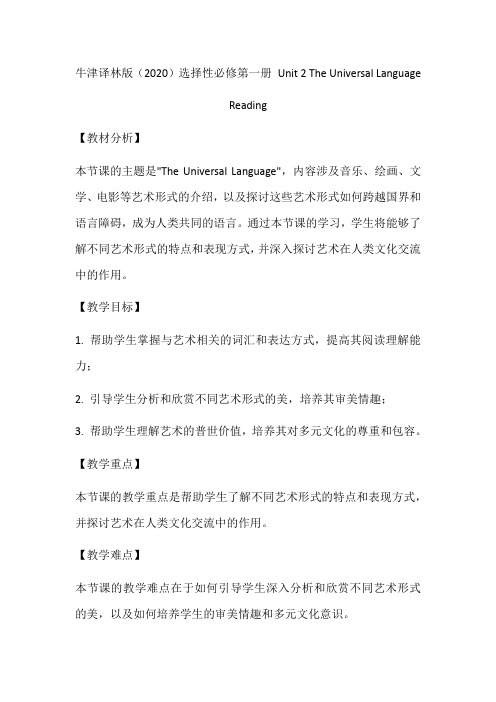
牛津译林版(2020)选择性必修第一册Unit 2 The Universal LanguageReading【教材分析】本节课的主题是"The Universal Language",内容涉及音乐、绘画、文学、电影等艺术形式的介绍,以及探讨这些艺术形式如何跨越国界和语言障碍,成为人类共同的语言。
通过本节课的学习,学生将能够了解不同艺术形式的特点和表现方式,并深入探讨艺术在人类文化交流中的作用。
【教学目标】1. 帮助学生掌握与艺术相关的词汇和表达方式,提高其阅读理解能力;2. 引导学生分析和欣赏不同艺术形式的美,培养其审美情趣;3. 帮助学生理解艺术的普世价值,培养其对多元文化的尊重和包容。
【教学重点】本节课的教学重点是帮助学生了解不同艺术形式的特点和表现方式,并探讨艺术在人类文化交流中的作用。
【教学难点】本节课的教学难点在于如何引导学生深入分析和欣赏不同艺术形式的美,以及如何培养学生的审美情趣和多元文化意识。
【学情分析】高一学生具有一定的英语阅读能力和文化背景知识,但他们对艺术和多元文化的认识还不够深入。
因此,在教学过程中,教师应该注重引导学生主动参与和思考,激发他们对艺术和多元文化的兴趣。
【教学策略】1. 运用多媒体技术辅助教学,展示不同艺术形式的图片、视频和音频素材,帮助学生直观了解相关内容;2. 组织小组讨论和分享活动,鼓励学生相互交流和合作,提高他们的参与度和合作能力;3. 布置课后作业,要求学生选择一种艺术形式进行深入研究,培养他们的自主学习能力。
【教学方法】1. 激活学生的前知:通过提问和讨论的方式,了解学生对不同艺术形式的认识程度和文化背景;2. 教学策略:采用讲解、示范、小组讨论和案例分析等多种教学策略,帮助学生掌握相关知识和技能;3. 学生活动:组织学生进行小组讨论、角色扮演和分享活动等,提高他们的参与度和合作能力;4. 教学评价:采用形成性评价和终结性评价相结合的方式,及时反馈学生的学习情况和表现,指导他们改进学习方法。
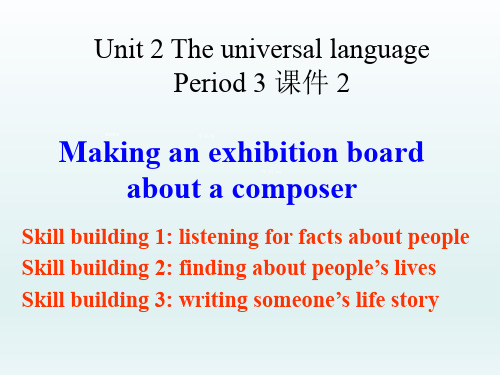
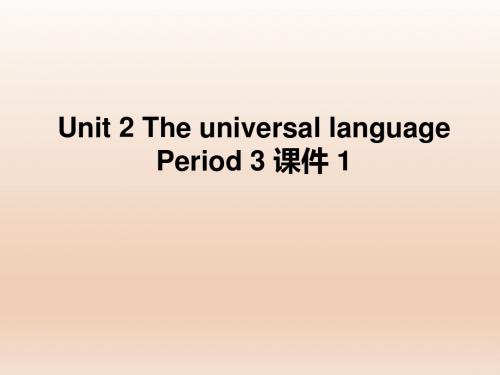
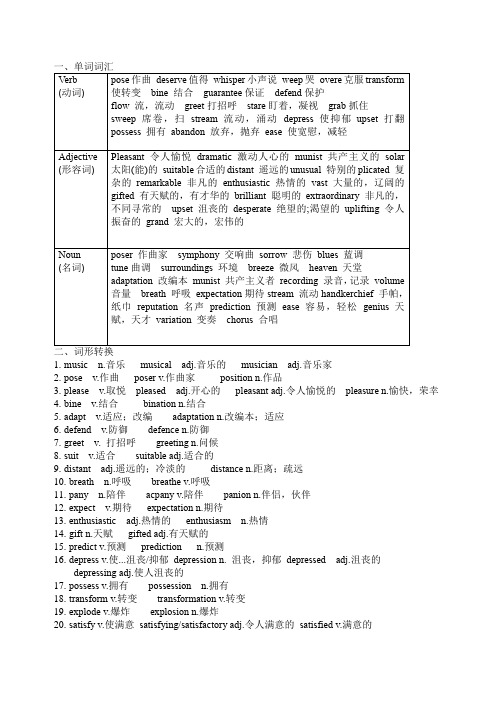
1.music n.音乐musical adj.音乐的musician adj.音乐家2.pose v.作曲poser v.作曲家position n.作品3.please v.取悦pleased adj.开心的pleasant adj.令人愉悦的pleasure n.愉快,荣幸4.bine v.结合bination n.结合5.adapt v.适应;改编adaptation n.改编本;适应6.defend v.防御defence n.防御7.greet v. 打招呼greeting n.问候8.suit v.适合suitable adj.适合的9.distant adj.遥远的;冷淡的distance n.距离;疏远10.breath n.呼吸breathe v.呼吸11.pany n.陪伴acpany v.陪伴panion n.伴侣,伙伴12.expect v.期待expectation n.期待13.enthusiastic adj.热情的enthusiasm n.热情14.gift n.天赋gifted adj.有天赋的15.predict v.预测prediction n.预测16.depress v.使...沮丧/抑郁depression n. 沮丧,抑郁depressed adj.沮丧的depressing adj.使人沮丧的17.possess v.拥有possession n.拥有18.transform v.转变transformation v.转变19.explode v.爆炸explosion n.爆炸20.satisfy v.使满意satisfying/satisfactory adj.令人满意的satisfied v.满意的satisfaction n.满意21.recognize v.认出;意识到recognition n.认识;赞赏22.rely v.依赖,信赖reliable adj.值得信赖的23.surround v.包围surrounding adj.周围的surroundings n.环境24.determine v.决心,决定determination n.决心determined adj.坚定的25.admit v.承认;允许进入admission n.承认;准入进入;入场费三、固定短语1. a wide range of types 种类繁多2. a piece of music 一首音乐3. a live music performance 现场音乐演出4.deserve to be done 值得被...5.the twists and turns 曲折,跌宕起伏6.tear apart使(关系密切的人)分离,开7.weep bitterly over the loss of... 因失去...而痛哭8.be overe with sorrow悲痛欲绝9.have one`s roots in起源于10.rely on依赖,依靠;信任11.it turns out that... 原来,结果是...12.throw in sth额外赠送13.give the public more access to music 给大众更多接触音乐的机会14.put on a series of free concerts 举办一系列免费音乐会15.bine…and/with…把…和…结合起来16.the munist Party of China中国共产党17.overe the Japanese invaders战胜日本侵略者18.in particular 尤其,特别19.deserve a mention 值得一提20.end with以...结尾21.think highly of 高度评价22.get tired of 厌倦23.it`s no use doing做...是没有用的24.be capable of 能够25.get down to (doing) sth开始着手做...26.have trouble doing sth 做某事有困难27.every other week 每隔一周28.in a state of 处在…的状态中29.turn up the volume调高音量30.stare at 凝视,盯住31.hold one`s breath屏住呼吸32.uncover the beauty of the song 发现歌曲的美33.grab the attention of sb 抓住某人的注意力34.sweep along席卷,使深受影响35.at the top of my voice 用最大的声音36.reflect on 反思37.a crowd of 一群38.stream into涌入39.break into enthusiastic cheers爆发出热情的欢呼40.be unaware of未意识到,没察觉到41.a sea of people 一群人42.enjoy a reputation as… 享誉…的盛名43.take a sharp turn 急转弯44.be determined to do sth 决定做...45.all of a sudden 突然46.strong will 坚强的意志47.with ease 从容地,熟练地48.be regarded as 被看作…三、好句积累1.It’s a piece that really deserves to be heard.这部作品真的值得一听。
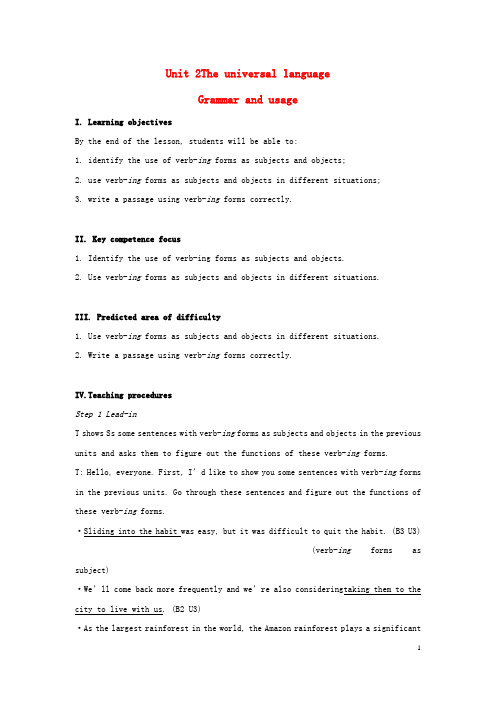
Unit 2The universal languageGrammar and usageI. Learning objectivesBy the end of the lesson, students will be able to:1. identify the use of verb-ing forms as subjects and objects;2. use verb-ing forms as subjects and objects in different situations;3. write a passage using verb-ing forms correctly.II. Key competence focus1. Identify the use of verb-ing forms as subjects and objects.2. Use verb-ing forms as subjects and objects in different situations.III. Predicted area of difficulty1. Use verb-ing forms as subjects and objects in different situations.2. Write a passage using verb-ing forms correctly.IV.Teaching proceduresStep 1 Lead-inT shows Ss some sentences with verb-ing forms as subjects and objects in the previous units and asks them to figure out the functions of these verb-ing forms.T: Hello, everyone. First, I’d like to show you some sentences with verb-ing forms in the previous units. Go through these sentences and figure out the functions of these verb-ing forms.·Sliding into the habit was easy, but it was difficult to quit the habit. (B3 U3)(verb-ing forms as subject)·We’ll come back more frequently and we’re also consideringtaking them to the city to live with us. (B2 U3)·As the largest rainforest in the world, the Amazon rainforest plays a significantrole in maintaining the fine balance of the Earth’s ecosystem. (B3 U1)·I was used to checking the news and my friends’ social media updates every few minutes. (B3 U3)(verb-ing forms as objects)T: In the first sentence, “sliding into the habit” serves as a subject. In the next three sentences, the underlined parts function as objects.【设计意图:学生在之前的课文中,已经接触了一些verb-ing形式用作主语和宾语的句子。
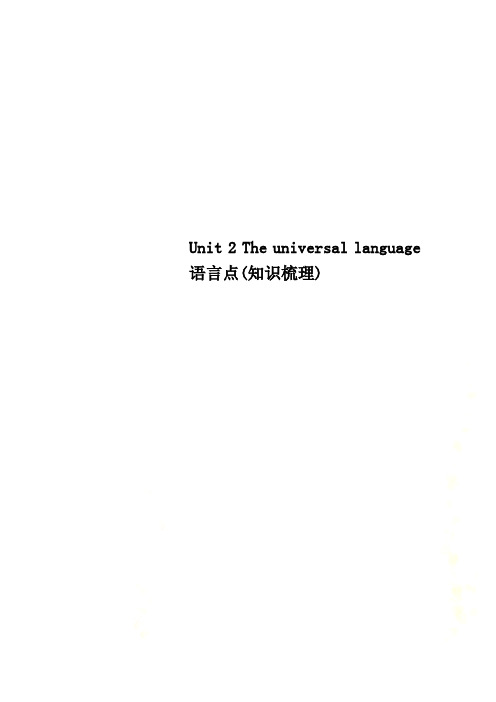
Unit 2 The universal language 语言点(知识梳理)Unit 2 The universal language 语言点学习目标重点词汇cast, participate, awesome, condemn, dare, disturbing, seize // demand, evident, opportunity, tendency, decline, seek重点短语shortly after(wards), fall in love // at first sight, leave out, put up, try out for, break up重点句型if necessary否定表达+比较级知识讲解重点词汇cast【原句回放】Some of the world’s greatest opera singers were cast in this production,and many great Chinese musicians also participated. 几位世界顶级歌剧演唱家担当主演,许多杰出的中国音乐家也参加了演出。
She participated with her friend in the activity. 她和朋友一起参与了这个活动。
【拓展】辨析:participate in, take part in, join in, attend, join1. participate in较正式,特指参加团体活动,暗示以一个积极的角色参加。
2. take part in侧重参加某项群众性、集体性的工作或活动,突出参加者在其中发挥一定的作用。
All the students took an active part in the thorough cleaning.所有的学生都积极参加了大扫除。
3. join in通常指参加某种活动,尤指和其他人一起参加某项活动。
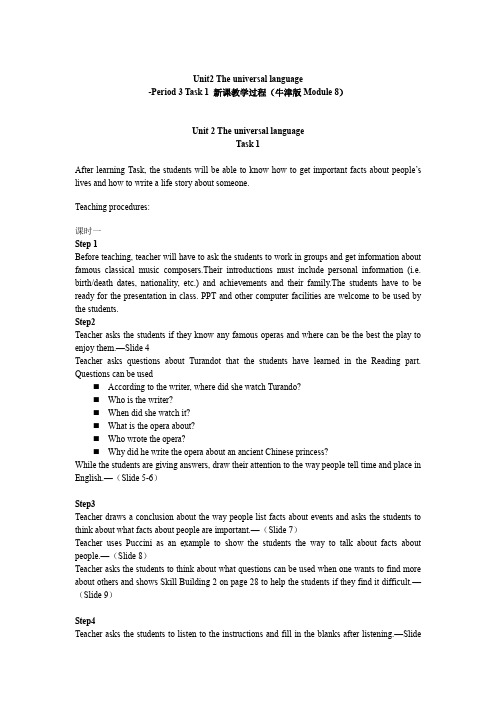
Unit2 The universal language-Period 3 Task 1 新课教学过程(牛津版Module 8)Unit 2 The universal languageTask 1After learning Task, the students will be able to know how to get important facts about people’s lives and how to write a life story about someone.Teaching procedures:课时一Step 1Before teaching, teacher will have to ask the students to work in groups and get information about famous classical music composers.Their introductions must include personal information (i.e. birth/death dates, nationality, etc.) and achievements and their family.The students have to be ready for the presentation in class. PPT and other computer facilities are welcome to be used by the students.Step2Teacher asks the students if they know any famous operas and where can be the best the play to enjoy them.—Slide 4Teacher asks questions about Turandot that the students have learned in the Reading part. Questions can be used⏹According to the writer, where did she watch Turando?⏹Who is the writer?⏹When did she watch it?⏹What is the opera about?⏹Who wrote the opera?⏹Why did he write the opera about an ancient Chinese princess?While the students are giving answers, draw their attention to the way people tell time and place in English.—(Slide 5-6)Step3Teacher draws a conclusion about the way people list facts about events and asks the students to think about what facts about people are important.—(Slide 7)Teacher uses Puccini as an example to show the students the way to talk about facts about people.—(Slide 8)Teacher asks the students to think about what questions can be used when one wants to find more about others and shows Skill Building 2 on page 28 to help the students if they find it difficult.—(Slide 9)Step4Teacher asks the students to listen to the instructions and fill in the blanks after listening.—Slide10Teacher asks what preparation the students need to make for a music festival and asks them to present what they’ve found about world-famous classical music composers group by group.—(Slide 11-12)After the presentation, the teacher shows the images of Mozart, Tchaikovsky and Paul Simon and asks for the differences.—(Slide 13)Step5Teacher asks the students to estimate what for each of the blanks before listening with the knowledge they’ve got about these three composers.—(Slide 14)Teacher shows the answers part by part by asking some questions after listening to see if the students totally understand.—(Slide 15-17)Teacher asks the students to read the three introductions about the composers on page 27 and use the information to fill in the rest of the blanks. –(Slide 18-20)Step6Follow-upTeacher asks the students to make up dialogues about one of the composers by using the information from listening and reading in Skill Building 1.—(Slide 21)Homework。
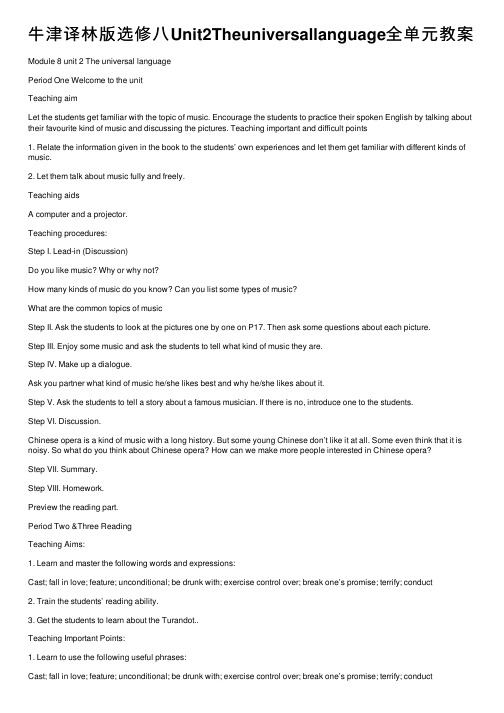
⽜津译林版选修⼋Unit2Theuniversallanguage全单元教案Module 8 unit 2 The universal languagePeriod One Welcome to the unitTeaching aimLet the students get familiar with the topic of music. Encourage the students to practice their spoken English by talking about their favourite kind of music and discussing the pictures. Teaching important and difficult points1. Relate the information given in the book to the students’ own experiences and let them get familiar with different kinds of music.2. Let them talk about music fully and freely.Teaching aidsA computer and a projector.Teaching procedures:Step I. Lead-in (Discussion)Do you like music? Why or why not?How many kinds of music do you know? Can you list some types of music?What are the common topics of musicStep II. Ask the students to look at the pictures one by one on P17. Then ask some questions about each picture.Step III. Enjoy some music and ask the students to tell what kind of music they are.Step IV. Make up a dialogue.Ask you partner what kind of music he/she likes best and why he/she likes about it.Step V. Ask the students to tell a story about a famous musician. If there is no, introduce one to the students.Step VI. Discussion.Chinese opera is a kind of music with a long history. But some young Chinese don’t like it at all. Some even think that it is noisy. So what do you think about Chinese opera? How can we make more people interested in Chinese opera?Step VII. Summary.Step VIII. Homework.Preview the reading part.Period Two &Three ReadingTeaching Aims:1. Learn and master the following words and expressions:Cast; fall in love; feature; unconditional; be drunk with; exercise control over; break one’s promise; terrify; conduct2. Train the students’ reading ability.3. Get the students to learn about the Turandot..Teaching Important Points:1. Learn to use the following useful phrases:Cast; fall in love; feature; unconditional; be drunk with; exercise control over; break one’s promise; terrify; conduct2. Train the students’ reading ability.Teaching Methods:1. Fast reading to get a general idea of the text.2. Careful reading to get the detailed information.3. Pair or group work to make every student work in class.Teaching Aids:The multimediaTeaching ProcedureStep 1 GreetingsStep 2 Lead-inTo start the lesson by asking the students some questionsAsk the students to talk freely in order to create an easy atmosphere to encourage the students to practise their spoken language. Ask the students to prepare some information in advance. Get the student to have a general idea of the opera. Step 3 Reading StrategyExplain the definition of a review to the students since different types of article have various ways of reading.1. What’s the definition of a review?A review is a report or an essay giving some information as well as some opinion or ideas about a book, performance, a painting or something similar.2. What should we pay attention to while reading a review of an opera?a. A review of opera usually starts with some background information.b. The review can five some imp ortant such as the actor’s names and finally an evaluation.c. The review may include lots of very descriptive words that reflect feelings.Step 4 Fast readingAsk the student to scan the text to finish the exercises in Part AStep 5 Listening and comprehensionListen to the recording and ask the students to finish the exercises on P 20 Part C1Answers:1. Because she felt that she could almost feel the history.2. She is cold-hearted.3. He was killed.4. She does not have to marry him.5. He promised to allow Turandot to choose her own husband.6. Eight.7. Turandot was played by Sharon Sweet from the USA, Liu was played by Barbara Hendricks from the USA and Calaf was sung by Kristian Johannsson form Iceland.8. The bringing together of the group of people from many countries, the music and the setting. Step 6 Post-readingIn order to have an accurate understanding of the text, ask the students to finish Part D on P20. And explain some morelanguage points to the students.1. witness n.e.g. According to (eye) witnesses, the robbery was carried out by two teenage boys.witness vtwitness doing sthe.g. He arrived home just in time to witness his brother being taken away by the police.2.star vt (e.g. The studio would like to star her in a sequel to last year’s hit.)cast vt (e.g. The doctor decided not to cast his new film with big-name actors.)3. setting n.e.g. The play has its setting in a wartime prison.be set in … (e.g. The story was set in Britain of the nineteenth century.)4. take ona. to accept a particular job or responsibility:e.g. She took too much on and made herself ill.b. to employ someone:e.g. She was taken on as a laboratory assistant.c. to compete against or fight someone:e.g. The Government took on the unions and won.d. to begin to have a particular quality:e.g. Her voice took on a troubled tone.5. exercise vt (to use one’s right, power or influence)e.g. The young employer simply does not know how to exercise his power over his employees. Since you’re a citizen of our country, you should exercise your right to vote.6. be desperate to do sth./be desperate for sth.( to be eager or in great need to do/for sth.)e.g. The old man was desperate to see his son, Who had left home to study abroad.The boy is desperate for a new pair of football shoes.7. leave vt 常⽤“leave+宾语+宾补”结构(to let sb. do sth. or be in a state/to let sth. be in a state )e.g. My grandma is over 80 years old, so do not want to leave her alone at home.The poor farmer died, leaving his wife and three children in poor conditions.When the couple went on holiday, they left their pet dog in the care of a friend.8. transform vt (to make a complete change of the appearance or character of)e.g. Plenty of rain might transform the area from a desert into a place full of plants.It is said that the old railway station built about 100 years ago will soon be transformed into arailway museum.Step 7 HomeworkPeriod Four Word powerTeaching Aims:1.Learn to read a passage of something about an orchestra and instruments used in an orchestra.2.Enlarge the students’ vocabulary.Teaching Important Points:1.Understand the meanings of words and expressions related to an orchestra.2.Master the words in this part and use them freely.Teaching Difficult Points:1.Knowing the main idea of the passage.2.Remember some new words about an orchestra.Teaching procedures:Step 1 Greetings1.Greet the whole class as usual.2.Check their homework if any.Step 2 Brainstorming1.What is an orchestra like?2.What kind of music is performed by an orchestra? (classical music/opera)3.Do you know any famous orchestras in China or in other countries around the world?Step 3 Vocabulary learning1.Read the web page in Part A carefully, and then complete the following chart written on the blackboard.Complete Part B individually and then check answers with a partner to see if they have got the answers. Suggested answers:strings: harp, violas, double bassesbrass: saxophones, trombones, tubaswoodwind: oboes, bassoons, piccolospercussion: timpani, xylophones, gongs2.Read the report and complete Part C individually referring to Parts A and B.Suggested answers:(1) orchestra (2) chamber (3) symphony(4) strings (5) brass (6) violins(7) cellos (8) brass (9) trumpets(10) Flutes (11) woodwind (12) bass drumsStep 4 Vocabulary extensionPlease focus on Part D and complete it individually.Answers to D:the instruments in red: stringsthe instruments in blue: woodwindthe instruments in green: brassthe instruments in yellow: percussionStep 5 HomeworkPeriod Five& Six Grammar and UsageTeaching Aim:Introduce the ellipsis.Teaching Important Point:The basic usage of the ellipsis and learn to use it in different situations.Teaching Difficult Point:How to help the students learn when to use ellipsis and how to use it correctly.Teaching Methods:Teaching and practicing.Individual or pair work.Teaching Aid:Multimedia.Teaching procedures:Step1: Introduction to ellipsisEllipsis means leaving out words of a sentence when the meaning can still be understood. Ellipsis is used when you do not want to repeat words or phrases that are obvious. You’re to learn when to use ellipsis and how to use it correctly.Step 2: PresentationSentences on the blackboard— How is your cousin today? ---(She is )Much better.(You) Open the the window, please!(It) Sounds fine to me.(It is a ) Pity our teacher couldn’t come.(Is there) Anything wrong?(Have you) Found your pencil?Read these sentences and point put the words that have been left out in each sentence.Step 3: Instructions1. Go over Part 1& Part 2Ellipsis is often used in imperative sentences, in short responses, in infinitive phrases and in informal English. Ellipsis is also used after hence, some prepositions or than. You should pay attention to the case in which ellipsis is used when two clauses with the same pattern and the same verb are used in a sentence.Read the examples in Point 2 and get to know that in some special styles, words are left out just to save space and time. When it comes to signs and labels, newspaper headlines, instructions, postcards, diaries and notes, ellipsis is often used. 2. More examplesStep 4: Practices1.Read Part A carefully and find out the words that can be left out.2.Read the instructions in Part B and finish the part individually.Answers:1 b2 c3 a4 d5 e1 Bob James, the pop star dies of drug abusing.2 This is the door to the stage.3 The performance last night was not as good as usual.4 Please handle this with care.5 Turandot is really a wonderful performance, and the setting is fantastic too.3. Do Part C1 and C2 on page110 of the Workbook. After doing the two exercises, they will know more clearly how to use ellipsis correctly.Step 5: Exercises1. — Are there any English story books for us students in the library?— There are only a few, ___________.A. if anyB. if thereC. if someD. if has2. — Would you like to go with us?— Yes, _____________.A. I'dB. I'd likeC. I'd like toD. I'd like to do3. — Would you like to have a try once again?— ________________.A. Yes, I likeB. No, I don’t like itC. Yes, I want very muchD. Yes, I’d like to4. — What do you think made Mary so upset?— ___________ her bicycle.A. As she lostB. LostC. LosingD. Because of losing5. — When did they get down to the job?— _______________.A. Until they leftB. Till they arrivedC. Since they finished itD. Not until they turned to me6. — Are you angry?— Yes. He should at least answer when _____________.A. speakingB. spoken toC. spokenD. speaking to7. Be careful while _________ the street.A. to crossB. crossingC. he crossesD. being cross8. _______ us for a dinner, don’t you?A. Don’t you joinB. JoinC. Have to joinD. Let’s join9. I promise we’ll be there at 6, _________.A. rainy or shineB. rains or shiningC. rain or shineD. rain or shining10. In the car accident the child was hurt, but ___________.A. the mother is killedB. the mother killedC. the mother being killedD. the mother has killed11. __________ I don’t remember where I met him.A. Fact is whichB. what the fact is thatC. The fact is whatD. Fact is12. He raised his hand __________ silence.A. as if to commandB. as though he going to commandC. as though to commandD. as of he commanding13. Francis Preston Blair, Jr., _________ born in Kentucky, lived and practiced law in Missouri.A. wasB. he wasC. althoughD. who he was14. We are to install this instrument ____________.A. as originally plannedB. as it originally plannedC. as was originally plannedD. as it being originally planned15. __________, people and objects are presented in a flat, often angular, abstract manner in Jacob Lawrence’s paintings.A. Always able to recognizeB. The ability to recognize alwaysC. While always recognizableD. Always can be recognizedAnswers:1-5 ACDCD 6-10 BBBCB 11-15 DCCACPeriod Seven& EightTask Writing a website negative emotional language Teaching Aims:1.To train the students’ ability of listening and writing.2.To master the skills in the writing of the life story of a composer3. To practise writing the life story of a composerTeaching procedure:Step 1 Review the last period of the unitSkills building 1: listening for facts about peopleWhen we are listening for facts about people, there are certain things we need to listen for. These includes:1. date when they were born and diede.g. He/She was born/died on 26 May 1962.2. places where they were born or died. These might be or countries.e.g. He/She was born in London, England.3. specific things that they did in their life. This will include dates and places such as when and where they got married or had a child, etc.e.g. He married Jane in Paris in 1999.4. information about why they did something and who or what influenced them.e.g. He wrote this opera because he liked East Asia.Step 2 ListeningWhile listening to the recording, ask the students to apply listening skills in practical use, such as note taking. The teacher should be responsible for the speed of the recording and make sure the student can finally understand the text as a whole. After the teacher can check the answers with the students.Step 3 Table fill-inIn this section, the students first are required to go through three passages on p 27. Since duringthe listening we have just finished part of the exercise, the teacher can design a skimming and scanning practice here, asking the students to find the relevant information of the table provided on P 26. And later ask the students to check their answers by presentation.Skills building 2: finding out about people’s livesSometimes you need to find out about people’s lives. You can start by asking the following questions.Which city/country was he/she born in?When was he/she born?What instruments did he/she play?When was …written?When did he/she die?Where did he/she die?Did he/she have brothers/sisters? What were their names?When did he/she get married?Who did he/she marry?Can you tell me any other information about him/her?Is there anything else you can tell me about him/her?Step 2 asking for further informationIn this section, the students are supposed to work in pair to practice the skills in skills buildings 2. The teacher can encourage the students to pracise their spoken language during this part, and later the teacher can also provide the sample answers to the students.Skills building 3: writing someone’s life storyWhen writing someone’s life story on an exhibition board, you need to:1. Start with his/her name as a little with the dates of his/her birth and death underneath.2. Perhaps use a timeline to illustrate what the person did in his/her life.3. Write the information in the order that it happened.4. Include pictures to make it attractive.Step 3: writing the life story of a composerIn this section, the students should apply their learned skills to practical use. First they have to collect some facts about the composers, find out about people’s lives and then write someone’s lifestory. The teacher first of all should remind the students of these steps and then give some instructions to the students. If it is needed, the teacher can also give the students a sample writing to show how they are supposed to phrase their article. Step 4 HomeworkPrepare for next period.Period Nine& Ten Project The universal language Teaching aimHelp students use what they have learnt to finish a project by working together.Teaching important and difficult points1. Help the students understand the text to collect as much information as they can.2. Ask the students to have a discussion about which singer or band they will focus on, what they will include in the project and how they can organize their webpage.Teaching aidsA computer and a projector.Teaching procedures:Step 1 Dictation.Step 2 Lead-inIn this unit, we have discussed different kinds of music. So today let’s have a closer look at the history and development of pop music.Step 3 First readingAsk the students to read the article “From jazz to pop” and then answer the questions.What is this text mainly about?It is about the history and development of pop music.How many periods can pop music be divided into according to the writer?Five periods. Early jazz, swing music, R&B, rock and roll, and 1960s pop music.Step 4 Second readingRead different parts of the text on by one.1. What was the most important instruments used in jazz?The trumpet is one of the most important instrument used in jazz2. Who is considered as one of the founding fathers of jazz?Louis Armstrong1. What is the difference between swing music and traditional jazz?Swing music is faster than traditional jazz and have a sort of swinging feel to the music.2. What are included in “big bands”?Big bands included a pianist a violinist and a bassist, as well as others.3. Who is considered as one of the pioneers of rock and roll?Big Joe Turner.1. Which band was the most successful rock and roll band of the 1960s?The Beatles.2. What is “Beatlemania”?The phenomenon that masses of fans of the Beatles welcome this band at the airport.Step 5 Finish exercises B1 and B2 on the page 109Step 6 Discussion.Work in groups to discuss how to research and what to research about a singer or a band and then answer the questions in part B.Step 7 HomeworkEach group should choose a singer or a band to research and then divide the work among group members. Each group member will be responsible for searching for some information. Use the information collected to make a webpage after class and present them to the class on the display wall.。

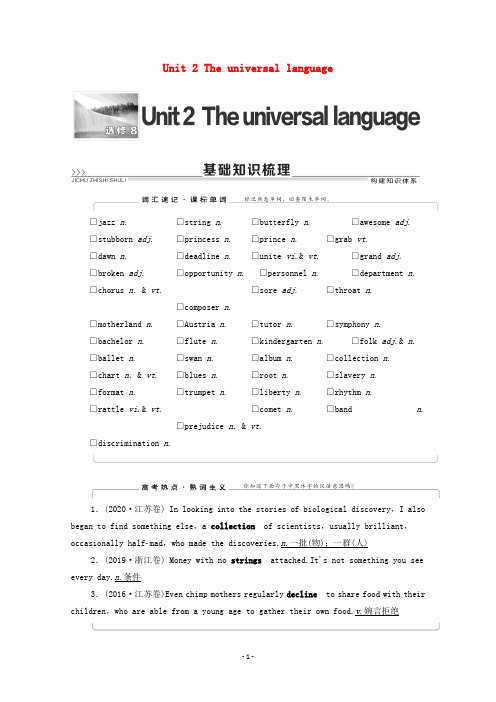
Unit 2 The universal language□jazz n. □string n. □butterfly n. □awesome adj.□stubbo rn adj. □prince ss n. □prince n. □grab vt.□dawn n. □deadline n. □unite vi.& vt. □grand adj.□broken adj. □opportunity n. □personnel n. □department n.□chorus n.& vt. □sore adj. □throat n.□composer n.□motherland n. □Austria n. □tuto r n. □symphony n.□bachelor n. □flute n. □kindergarten n. □folk adj.& n.□ballet n. □swan n. □album n. □collection n.□chart n.& vt. □blues n. □root n. □slavery n.□format n. □trumpet n. □liberty n. □rhythm n.□rattle vi.& vt. □comet n. □band n.□prejudice n.& vt.□discrimination n.1.(2020·江苏卷) In looking into the stories of biological discovery,I also began to find something else,a collection of scientists,usually brilliant,occasionally halfmad,who made the discoveries.n.一批(物);一群(人) 2.(2019·浙江卷) Money with no strings attached.It's not something you see every day.n.条件3.(2016·江苏卷)Even chimp mothers regularly decline to share food with their children,who are able from a young age to gather their own food.v.婉言拒绝[单词拼写·运用]1.cast(cast,cast)vt.& vi.选派角色;投射(光、影);向……投以(视线、笑容)n.全体演员be cast down (by sth.) (因某事)沮丧/失望cast light on/upon弄清楚,使人明白cast a glance/look at/toward...朝……瞧了瞧cast sb.as...选派某人演……角色be cast down by the news对这个消息很失望begin to cast doubt on his honesty开始怀疑他的诚实be cast as a troublemaker被认定为惹是生非者be cast as a beggar被选派演一个乞丐cast an impatient look at Mitch很不耐烦地看了米奇一眼[基础练习]——单句语法填空①The circumstances were all against Joe,but he was not cast down.②The director cast a wellknown actress as Marie Curie in the movie.③A research has now cast light on/upon the mystery of why the animals died.[链接写作]——词汇升级(普通表达)The information offered by the old man may help make the mystery clear.①(高级表达)The information offered by the old man may help clarify the mystery.(clarify)②(高级表达)The information offered by the old man may help cast_light_on/upon the mystery.(cast)2.condemn vt.判刑,宣判;指责,谴责be condemned to sth.被处以某种刑罚;使某人被迫接受某种困境condemn sb.to death判处某人死刑condemn sb.for (doing)sth.因(做了)某事而谴责某人condemn...as...指责……为……be condemned to do sth.注定做某事be condemned to life imprisonment被判处终身监禁be condemned to death被判死刑be condemned to hang for killing her husband因杀害亲夫被处以绞刑be condemned as unfit to eat被宣告不宜食用be condemned to spend the rest of the football season on the beach只得在这个足球赛季剩下的时间里做替补队员[基础练习]——单句语法填空①He was widely condemned for his cruel action towards his elderly parents.②Most of people are willing to condemn violence of any sort as evil.③Phelps,the American swimmer was condemned to a six month suspension from swimming as a result of his DUI.④Do you condemn yourself for things which you did or failed to do in the past?[链接写作]——词汇升级(普通表达)Any attempt to set back the wheel of history is sure to fail.(高级表达)Any attempt to set back the wheel of history is_condemned to fail.3.dare vt.& vi.& aux.敢于,胆敢[高考原句·2020·天津卷]I wouldn't have dared to ask you,but my teacher,ls,says I am ready.(1)dare用作实义动词时,有人称、数和时态的变化。
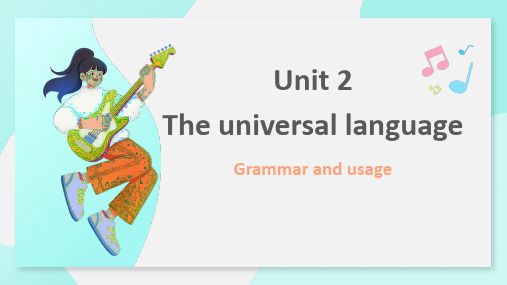


Unit 2 The universal language Period 3 课件1一、根据句意和首字母提示提示写出所缺单词的完全形式1. We must s all opportunities to accelerate development.2. Never have I seen such a s person. I cannot persuade him.3. Let me clean up the b glass before someone walks on it.4. U to obey his parents,the boy escaped from home.5. The key to solving the problem is to satisfy the d made by the workers.6. The m king forgave the young officer and saved him from death.7. All of them had to work around the clock in order to meet the d .8. I offered him a lift to his house,but he d with thanks.9. The t for women to marry and bear children late results in population decreasing.10. The rise in violent crime is a d new trend.11. If you hesitate too long,you will miss the o .12. We shouldn't s after comfort,personal fame.13. Losing weight is a slow,g_________ process.14. A judge must be free from p .15. He was d when he lost all his money.16. Don' t s her and after all she's too young to understand.17. It is e that he is not equal to the job.18. His parents employed a t to teach him mathematics.19. It is often used as f medicine to cure snake bites.20. Strongly opposed to racial d ,he insists that everyone be treated equally.二、从下列表格中选择恰当的词组填空1. It is natural that he should such a beautiful girl.2. The friendship based on common interest does not easily.3. Under given conditions,the harmful can the beneficial.4. They fell in love with each other and in a short time were married.5. In the past few years,a lot of tall buildings has in our city like mushrooms.6. Located on top of the mountain,the temple tourists only on foot.7. We think it important that theory must be practice.8. How many people the opening ceremony?9. Please the list of words.10. When he was five years old,he performing on stage.三、单项填空1.The judge ________the criminal to ten years in jail.A. condemnedB. abusedC. accusedD. transformed2.The manager ________one of the hotel servants of stealing the money.A. scoldedB. complainedC. accusedD. charged3.There is a growing ________ to regard money more highly than quality of life.A. tendencyB. floodC. decreaseD. direction4.Faced with such a difficult situation,he had to ________ advice from his boss.A. askB. seekC. lookD. find5.—I'm surprised to hear that Cecilia Cheung (张柏芝) and Nicholas Tse (谢霆锋) have ________.—So am I. They seemed very happy together when we saw them on TV.A. broken upB. finished upC. divided upD. closed up6.At the railway station,the mother waved goodbye to her daughter until the train was ________.A. out of sightB. out of reachC. out of orderD. out of place7.—The town is so beautiful!I just love it.—Me too. The character of the town is well .A. qualifiedB. preservedC. decoratedD. simplified8.Tom's parents have ________,which makes him feel so sad and lonely.A. divided upB. cut upC. separated upD. split up9.Nowadays new buildings are ________ everywhere,satisfying people's demand for better housing conditions.A. getting upB. coming upC. giving upD. springing up10.As a teacher,we shouldn't have ________ against any student even though they sometimes make mistakes.A. relianceB. influenceC. prejudiceD. attitude11.In making a scientific experiment,one should not be _______ by temporary setbacks but should persist in doing it hopefully.A. cast downB. put awayC. taken inD. given out12.According to scientists,our mental abilities begin to _________ from the age of 27 after reaching the highest level at 22.A. differB. shrinkC. failD. decline13.They________that the books be returned to the school library at once.A. hopedB. wishedC. permittedD. demanded14.In spite of his serious and illness,he still stuck to his post until he was forced to leave.A. stableB. stubbornC. firmD. effective15.How can you believe a person who has his promise again and again?A. keptB. brokenC. realizedD. made16.In just a decade,the company has been ________ from a family business to a large operation.A. transformedB. transmittedC. transferredD. transported17.The mother opened the door quietly so as not to ______ the sleeping baby.A. upsetB. interruptC. disturbD. release18.Frank put the medicine in the top drawer to make sure it would not be_______ to the kids.A. accessibleB. relativeC. acceptableD. sensitive19.Don't hesitate;________ the opportunity that comes along!A.set B.bring C.seize D.associate20.She _______ you for your money,but not for love.A. married withB. married toC. got marriedD. married四、完型填空In 1990 a report was published about what the earth might be like 20 years from then on. The report was a result of a three-year 1 . according to the report,the picture of the earth in the year 2010 is not a 2 one. The world will be more 3 because the population will continue to grow. The population could be 4 6,300 million,almost 2,150 million more than in 1985. More people would move into cities,especially cities in 5 countries. Cities like Cairo and Jakarta probably would 6 have 15 million by then.Food production will 7 ,but not enough to feed all the people. Farmers will grow 90% more food than they did in 1985,8 most of the increase would be in countries that 9 produce enough food for their people. Little increase is 10 in South Asia,Africa and the Middle East. Poor farming ways are 11 large areas of crop land,changing farms into deserts. More farmland is 12 as cities become larger and more houses are built. Air pollution will get worse and worse as industrial countries 13 more coal and oil. Many of the wo rld’s forests could disappear as more and more trees are 14 . Energy will continue to be a serious problem. The experts say their picture of the earth for the year 2010 may be 15 . They only carried out the situation that 16 today. By changing the situation,by 17 the problems,the picture can be changed. There is still a(n) 18 for the nations of the world to work 19 a plan of action. But they warned that 20 too long to make decisions would greatly reduce the chances of success.本文介绍了地球最近20年来的环境变化,告诉我们环境正在发生很多的变化,人类要注意保护好我们的地球。